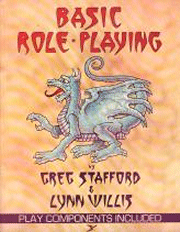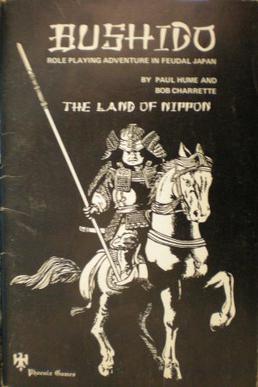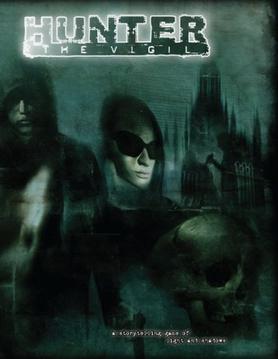
Basic Role-Playing (BRP) is a tabletop role-playing game which originated in the RuneQuest fantasy role-playing game. Chaosium released the BRP standalone booklet in 1980 in the boxed set release of the second edition of RuneQuest. Greg Stafford and Lynn Willis are credited as the authors. Chaosium used the percentile skill-based system as the basis for most of their games, including Call of Cthulhu, Stormbringer, and Elfquest.

Fudge is a generic role-playing game system for use in freeform role-playing games. The name "FUDGE" was once an acronym for Freeform Universal DonatedGaming Engine and, though the acronym has since been dropped, that phrase remains a good summation of the game's design goals. Fudge has been nominated for an Origins Award for Best Role-Playing Game System for the Deryni Adventure Game.

A gamemaster is a person who acts as an organizer, officiant for regarding rules, arbitrator, and moderator for a multiplayer role-playing game. They are more common in co-operative games in which players work together than in competitive games in which players oppose each other. The act performed by a gamemaster is sometimes referred to as "Gamemastering" or simply "GM-ing".

An adventure is a playable scenario in a tabletop role-playing game. These can be constructed by gamemasters for their players, and are also released by game publishers as pre-made adventure modules. Different types of designs exist, including linear adventures, where players move between scenes in a pre-determined order; non-linear adventures, where scenes can go in multiple directions; and solo adventures, which are played alone, without a game group.

Beyond the Supernatural is a horror role-playing game published by Palladium Books. It has seen two editions released, both of which have introduced innovations to Palladium's standard mechanics. A versatile horror-themed game, it lends itself well to wildly different play styles and narrative tones, from schlock splatter-horror to intense psychological horror, with an entire spectrum of terror in between. Beyond the Supernatural is implicitly set in the modern day, wherein magic and psychic powers are real and monsters and demonic cults exist, but out of the public eye. This, however, is not set in stone, and most of the character classes are flexible enough to account for variant settings or time periods.

Mercenaries, Spies and Private Eyes (MSPE) is a tabletop role-playing game designed and written by Michael A. Stackpole and first published in April 1983 by Blade, a division of Flying Buffalo, Inc. A second edition was later published by Sleuth Publications in 1986, but Flying Buffalo continues to distribute the game. In 2019 a new revised Combined Edition of MSPE was published by Flying Buffalo which brought the different material from the previous editions and included additional new rules and expansions to the original rpg. MSPE's mechanics are based on those of Tunnels and Trolls, with the addition of a skill system for characters. A few adventure modules were also released for MSPE.

James Bond 007: Role-Playing In Her Majesty's Secret Service is a spy fiction tabletop role-playing game based on the James Bond books and films. It is designed by Gerard Christopher Klug and was published by Victory Games, a subsidiary of Avalon Hill. The game and its supplements were published from 1983 until 1987, when the license lapsed. At its time of publication, it was the most popular espionage role-playing game.

Conspiracy X is a role-playing game (RPG) originally released by New Millennium Entertainment in 1996, and since revised and released by several publishers including Steve Jackson Games and Eden Studios, Inc. In all versions, the setting posits that aliens are insiduously taking over the world, reminiscent of The X-Files.

Bushido is a Samurai role-playing game set in Feudal Japan, originally designed by Robert N. Charrette and Paul R. Hume and published originally by Tyr Games, then Phoenix Games, and subsequently by Fantasy Games Unlimited. The setting for the game is a land called Nippon, and characters adventure in this heroic, mythic, and fantastic analogue of Japan's past.

Starfaring was the first science fiction role-playing game (RPG) published, released by Flying Buffalo in August 1976. Although it was the first to market, it didn't attract an audience, and was soon superseded by the much more popular Traveller published the following year.

Hunter: The Vigil is a tabletop role-playing game originally published by White Wolf Publishing on August 14, 2008, and is the sixth game in their game series Chronicles of Darkness – a reboot of the World of Darkness series. Led by a storyteller, players take the roles of people who have learned of the existence of the supernatural, and fight back against monsters as groups of hunters.

Daredevils is a tabletop role-playing game published by Fantasy Games Unlimited (FGU) in 1982 that is meant to emulate pulp magazine fiction of the 1930s.

Lords of Creation is a multi-genre tabletop role-playing game published by Avalon Hill in 1983. Although expectations were high when Avalon Hill entered the role-playing game market, the game failed to find an audience and was discontinued relatively quickly.

A gamemaster's screen, also called a GM's screen, is a gaming accessory, usually made out of either cardboard or card stock, and is used by the gamemaster to hide all the relevant data related to a tabletop role-playing game session from the players in order to not spoil the plot of the story. It also hides any dice rolls made by the gamemaster that players should not see. In addition, screens often have essential tables and information printed on the inside for the gamemaster to easily reference during play.

Sandman: Map of Halaal is a role-playing game (RPG) published by Pacesetter Ltd in 1985 that was marketed as an "Instant Adventure" requiring no preparation by the players — their characters awake with amnesia and must struggle to discover who they are. Map of Halaal was the first in a planned trilogy of Sandman adventures, but Pacesetter went out of business before the rest of the series could be published.

The Demon City Shinjuku Role-Playing Game is an anime-inspired supernatural horror role-playing game published by Guardians of Order in 1999 that is based on the novel and anime series of the same name.

Thunder Over Jotunheim is a role-playing game adventure published by TSR in 1985 for the Marvel Super Heroes role-playing game.

Endgame is an adventure published by West End Games in 1996 for the science-fiction role-playing game Star Wars: The Roleplaying Game.

Legendary Lives Player's Primer is the first of two books published by Marquee Press in 1990 required for the role-playing game Legendary Lives.

Indiana Jones and the Rising Sun is a supplement published by West End Games (WEG) in 1994 for the action-adventure role-playing game The World of Indiana Jones, itself based on the Indiana Jones movie franchise.




















